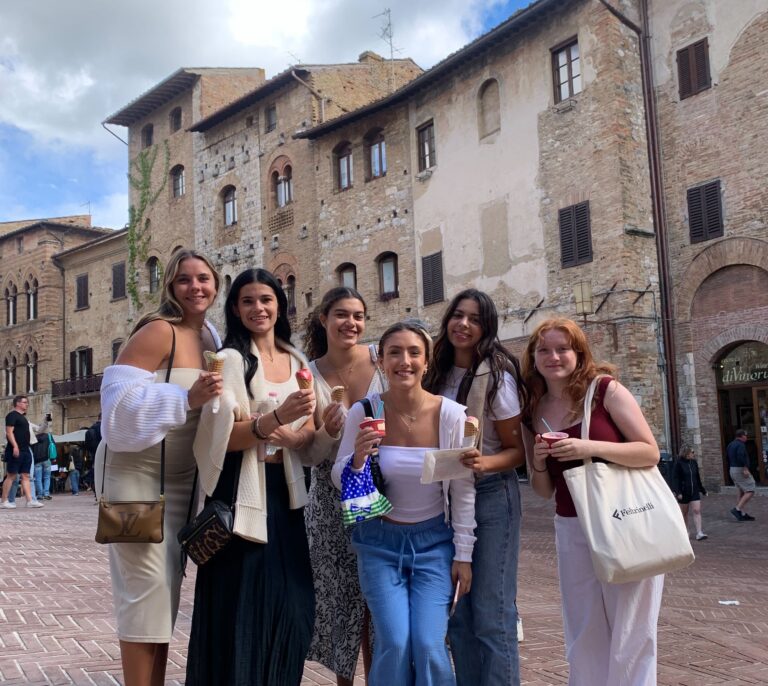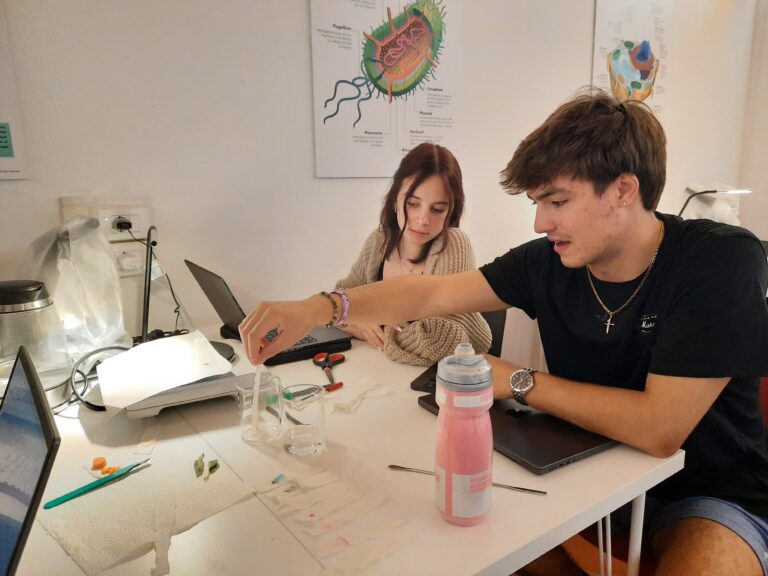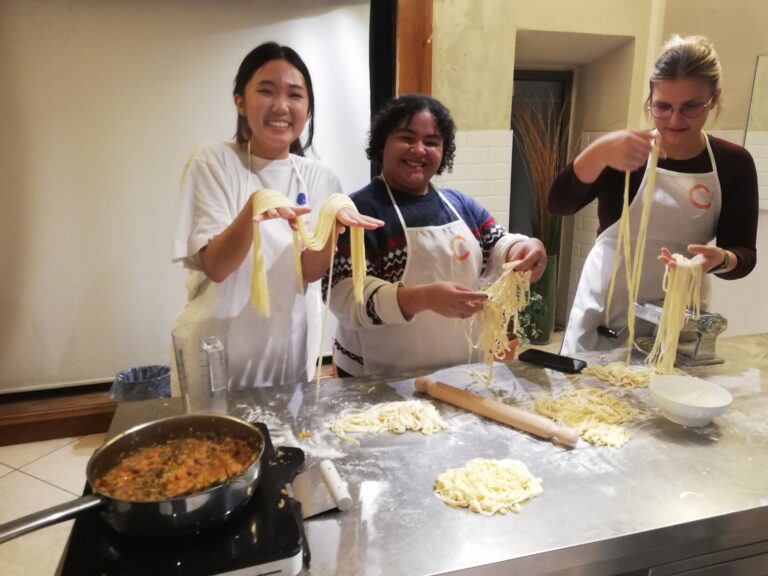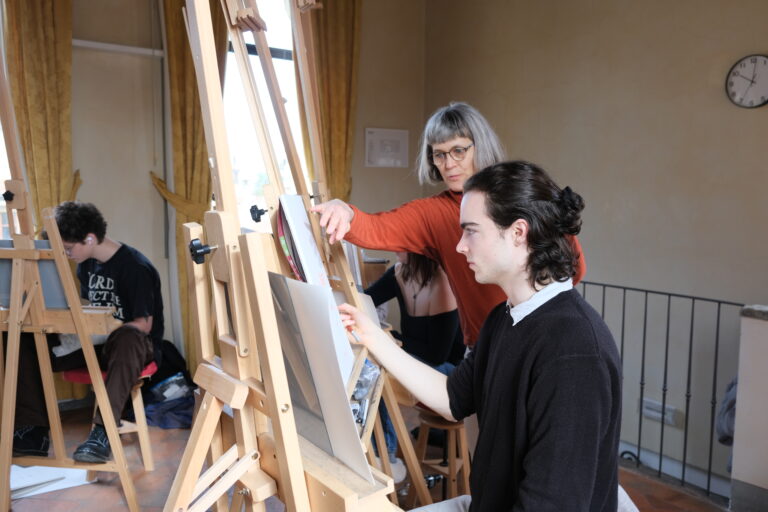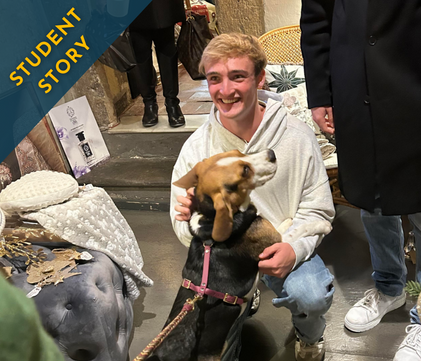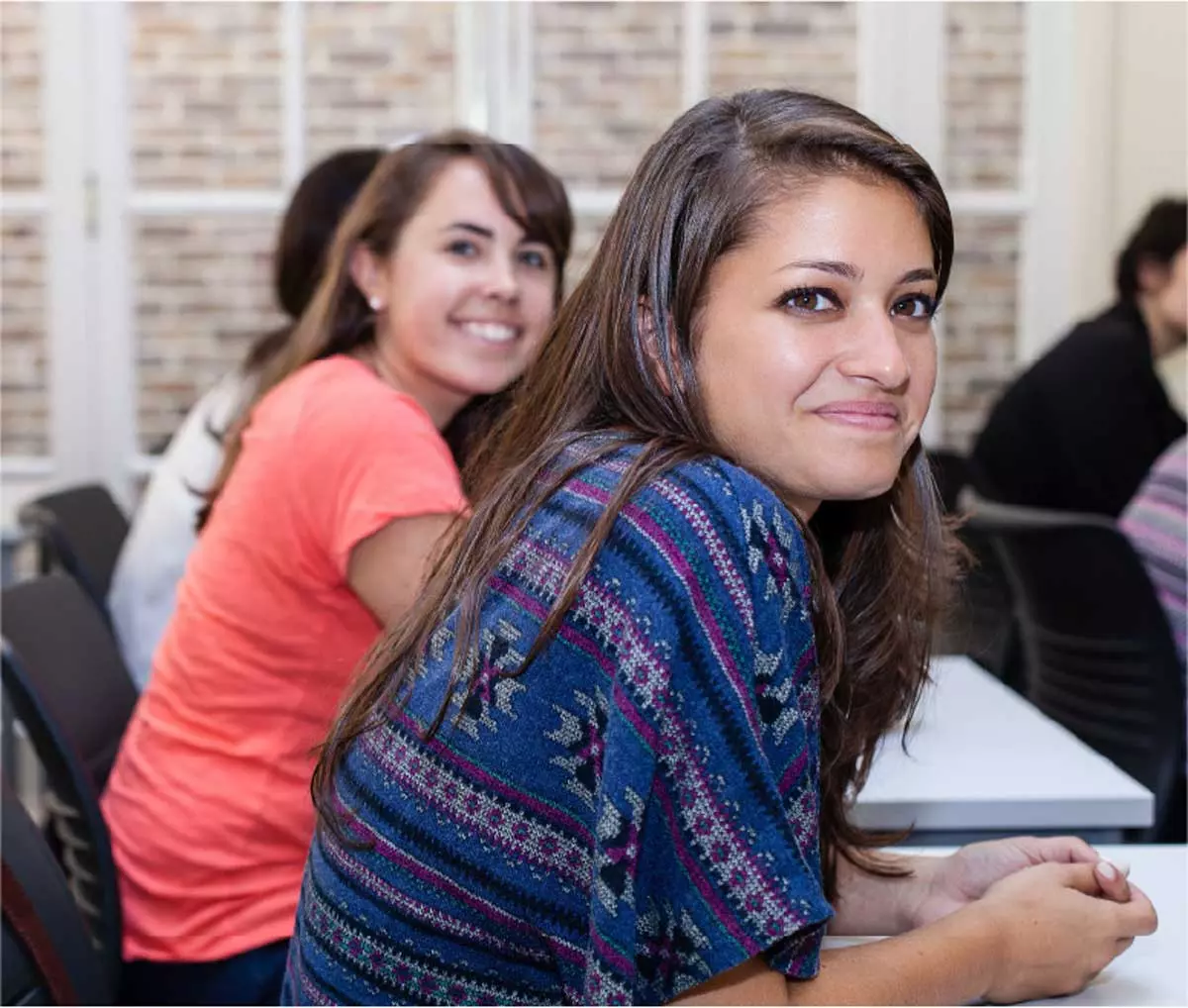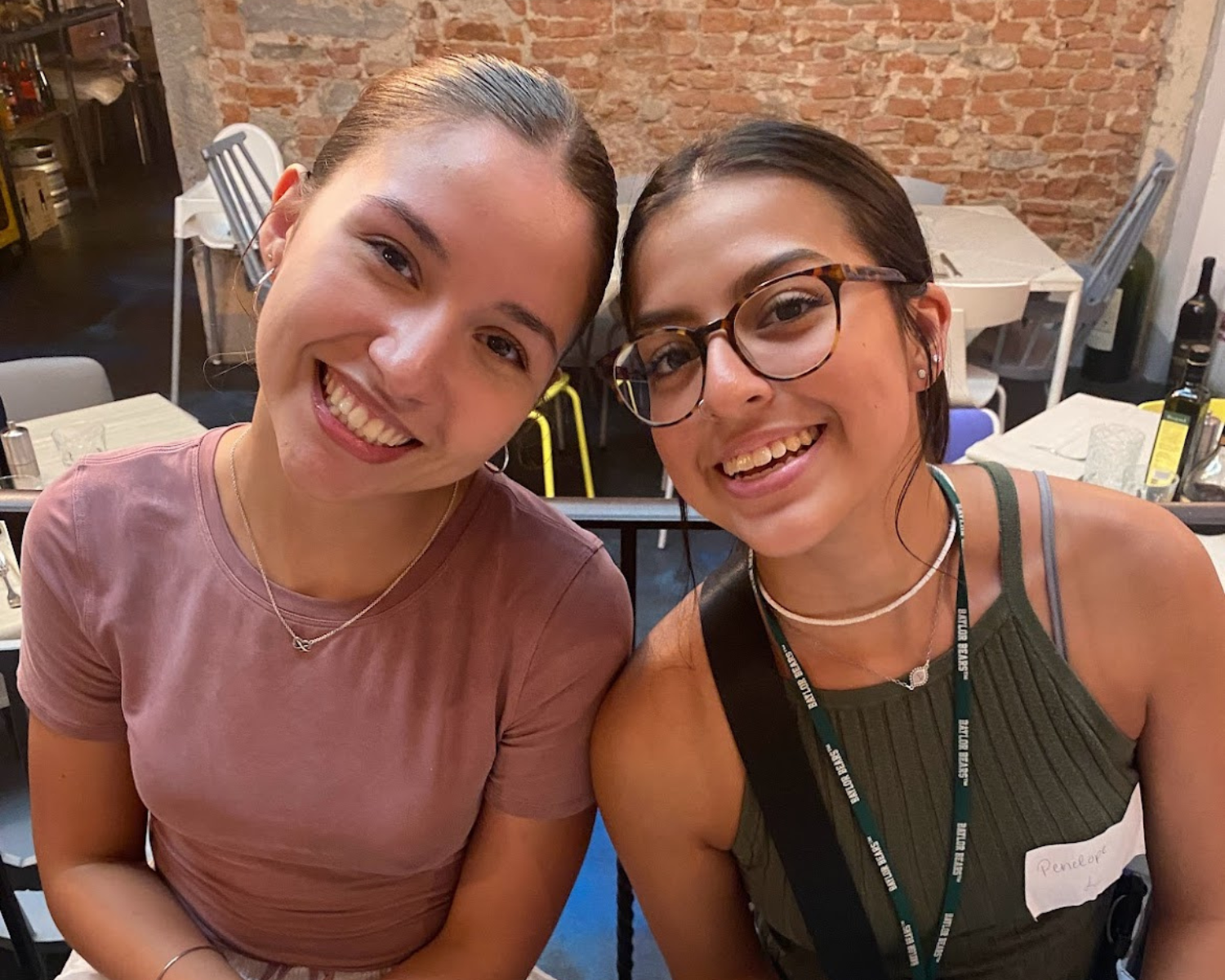
STUDY ABROAD IN
FLORENCE,
ITALY
GAIN A GLOBAL PERSPECTIVE in Florence, Italy
Study abroad in Florence and dive into the heart of Italy’s artistic and cultural legacy. From its world-renowned cuisine, breathtaking art, enchanting streets, and rich history — you’ll find it all.
Dates & Deadlines
- Spring ’26: Jan. 27 – May 9 (Enroll by 11/24/25)
- Fall ’26: Aug. 24 – Dec. 5 (Enroll by 6/1/26)
Requirements
- Fall Semester Abroad: Must be 18 by June 1
- Valid Passport
- Country-specific Visa (additional cost)
Program Cost
- Spring ’26: $23,750* before study abroad scholarships or grants
- Fall ’26 & Spring ’27: $25,500* before study abroad scholarships or grants
*A $2,500 administrative fee applies for non-U.S. citizens/non-U.S. permanent residents.
College Credits
- 12-17 Credits from our Academic Provider, the University of New Haven
Accommodations
- Shared apartment
WHAT WILL MY LIFE LOOK LIKE in Florence
Immerse yourself in the unbelievable culture of Florence by strolling through historic piazzas or crossing the iconic Ponte Vecchio on your way to class. During your free time, explore world-class museums, visit local markets, or savor the incredible culinary scene in charming trattorias with all the fresh pasta your heart desires. Florence’s unique blend of small-town charm and city life makes it easy to connect with the local culture and fellow international students.
Getting around Florence: Florence is best enjoyed by foot, allowing you to easily explore its impactful history and landmarks. Vertoans receive full support to explore Florence independently and can join various extracurricular activities and day trips organized by Verto.
Excursions & Activities
Possible Italy Study Abroad Excursions:
Day Trips: Explore stunning locations like the Tuscan countryside, Rome, Lucca, or Bologna.
Overnight Trips: Enjoy an overnight adventure to places such as Verona and Lake Garda or Venice and Murano Island.
Cultural Experiences: Attend an opera night at Saint Mark’s, visit local urban farms, and explore the birthplace of the Renaissance.
Additional Activities: Go hiking in Fiesole and explore art exhibits in Palazzo Strozzi.
Excursions are subject to change based on availability each semester, ensuring a dynamic and enriching experience.
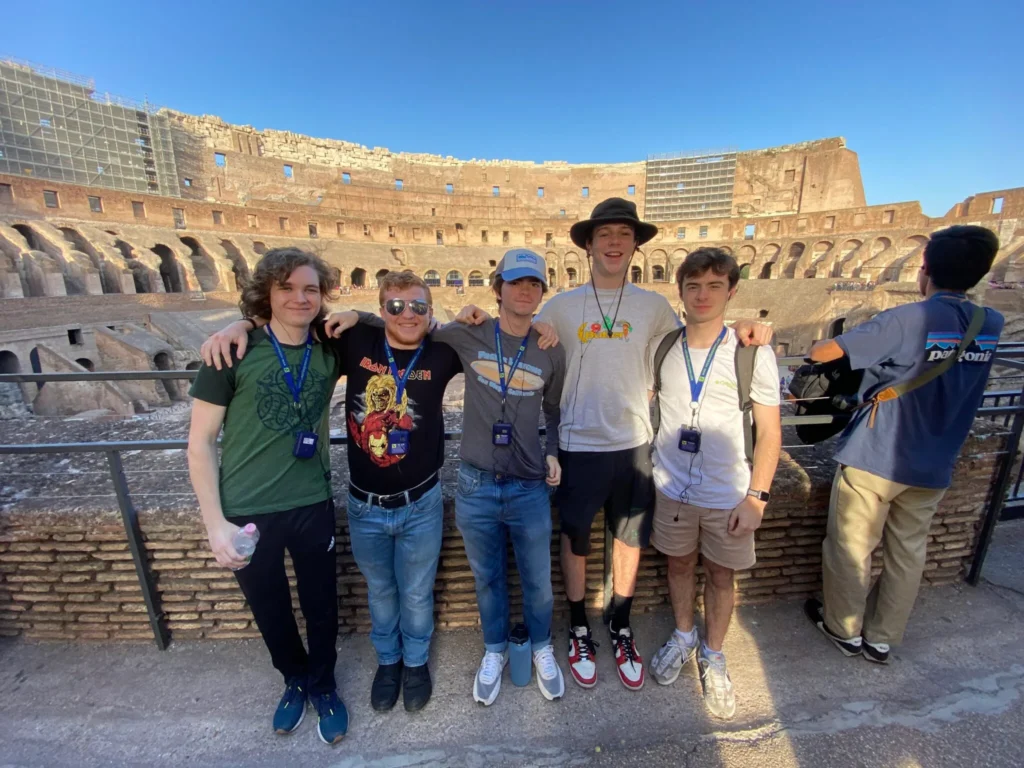
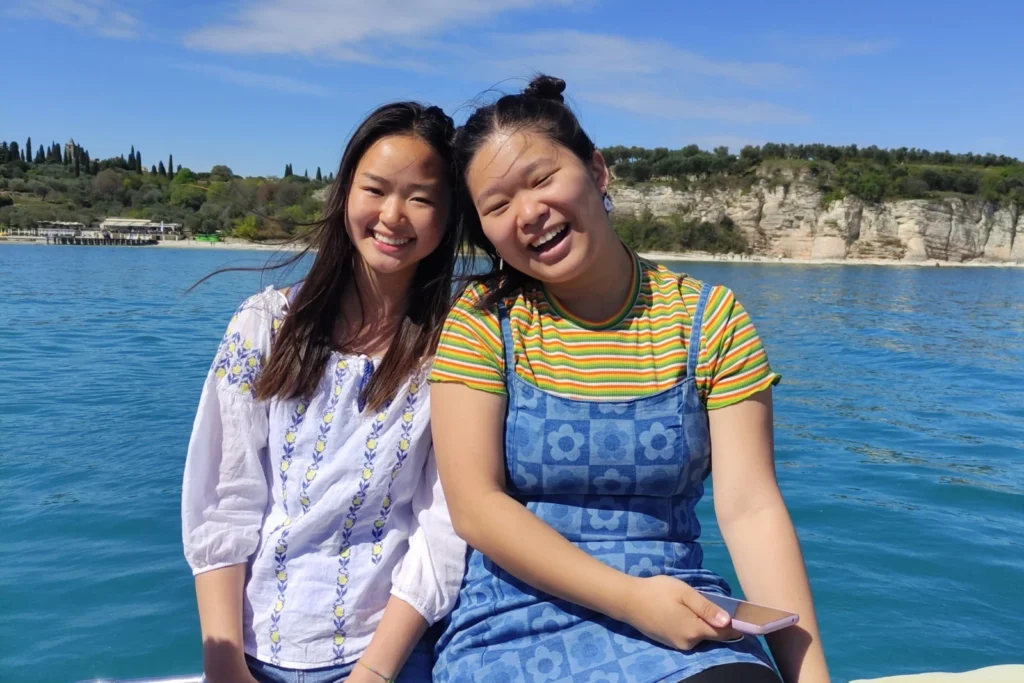
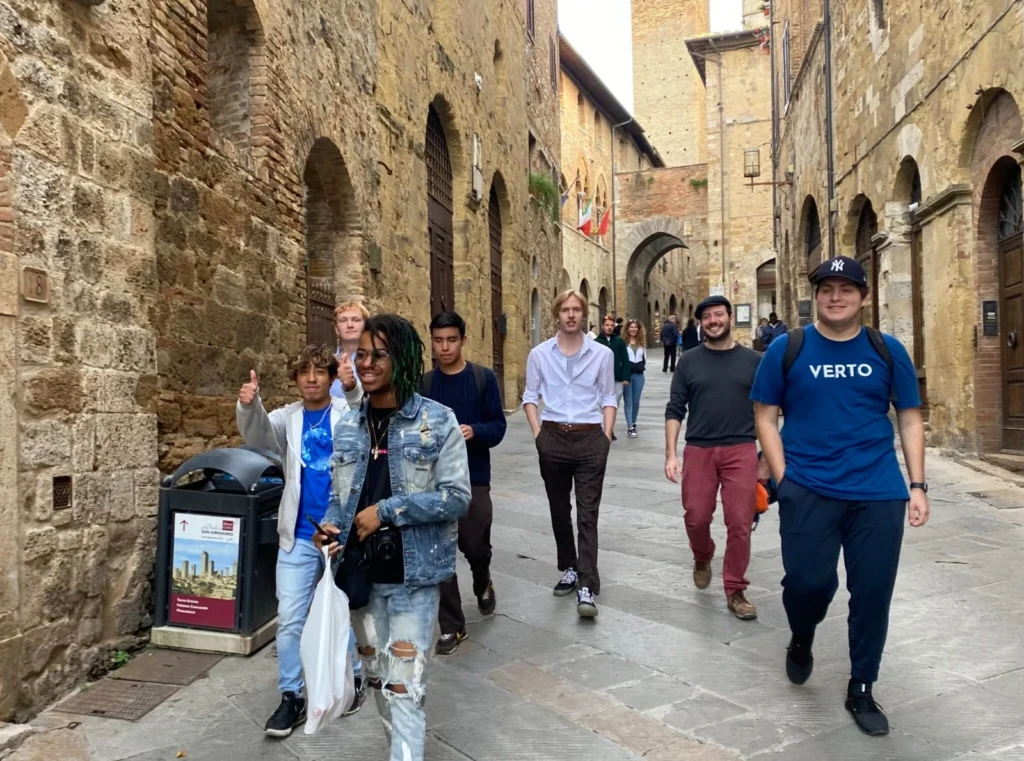
Accommodations
& Meals
Your Home in Florence
Verto participants will live in apartment housing scattered throughout the historical center of Florence, giving you an authentic local experience.
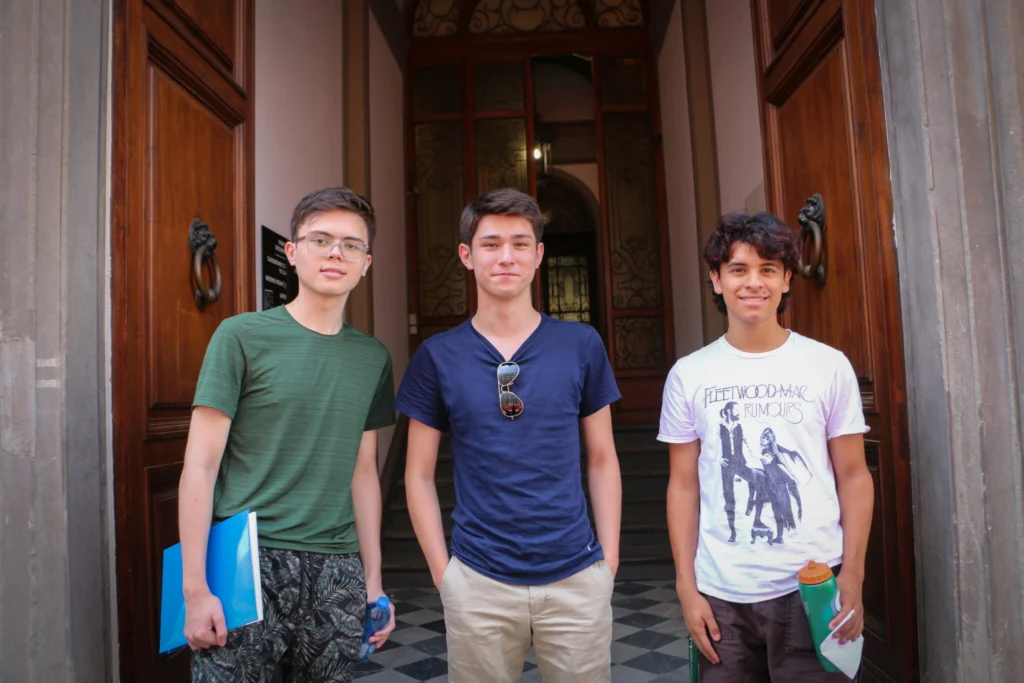
Verto Florence Study Center
Situated along the beautiful Arno River and steps away from the U.S. Embassy, the Verto study center in Florence is in a prime location. You can easily walk to major attractions like Piazza della Signoria, Palazzo Pitti, and the Boboli Gardens. The central spot means you’re always close to the action, whether it’s a cultural festival, a historic site, or a famous pasta spot.
ACADEMICS in Florence
During your Florence study abroad experience, you’ll earn transferable college credits from Verto’s Academic Provider, the University of New Haven.
Verto’s Unique Academic Experience:
Small Class Sizes with Caring Professors: Enjoy personalized attention and engaging learning environments with an average classroom size of 16.
Excursions and Hands-On Learning Opportunities: Step outside of the classroom as you experience the culture and history of Florence through immersive activities.
Academic Support & Advising: Receive customized support to strengthen your academic skills, access resources like study groups and tutoring, and get 1:1 guidance on your journey to achieving your goals.
Florence Course Spotlight
*All classes at Verto locations are delivered by our accredited Academic Provider, the University of New Haven.
Course Information
Art and Science of Renaissance Italy
This course explores the mutual interaction of artistic production and scientific activity during the Italian Renaissance. It examines the achievements of a range of pioneering Renaissance artist/scientist figures including Brunelleschi, Leonardo da Vinci, and Galileo, explains the fertile interplay between the two fields, and reveals how they were simultaneously stimulated by courtly patronage, politics, and new notions of display.
Biology I: Molecular Basis of Life w/ Lab
Part of a year-long foundation course for science majors. The course explores the principles of biological organization with an emphasis on cell structure and function. Topics covered include molecular cellular organization and function, gene expression, cellular division, genetic inheritance, and processes involved in the synthesis and metabolism of carbohydrates.
Calculus I
The first year college course for majors in mathematics, science and engineering; and the basic prerequisite for all advanced mathematics. Introduces differential and integral calculus for functions of one variable, including algebraic and transcendental functions and culminates in the fundamental theorem of calculus. Includes basic rules and properties of limits and derivatives and applications of derivatives. Studies the plane analytic geometry needed for calculus.
Calculus II
Continuation of first year calculus, including the fundamental theorem of calculus, methods of integration, applications of the integral, improper integrals, infinite series, and introduction to differential equations.
College Algebra
A review of the fundamental operations and an extensive study of functions, exponents, radicals, linear and quadratic equations. Additional topics include ratio, proportion, variation, progression and the binomial theorem. This course is intended primarily for students whose program of study requires calculus or business math.
Diversity and Social Justice
Local and global communities are rapidly becoming more diverse. Social, technological, and economic changes bring us in close contact with individuals of backgrounds that are unique from our own. Successful engagement in this global society calls for greater reflection on our worldviews, challenging perceptions, developing empathy for others, and awareness of our biases and perceptions. Further, it also requires critical consumption and production of knowledge, stories, and data. This course will help students develop the tools to participate in diverse organizations, have productive—but courageous—conversations, determine what makes for good evidence, and apply evidence to the social world. Developing these critical and empathic skills will prepare students to thrive at the University in their other courses, student organizations, and high impact education opportunities, and to act as educated, purposeful, and civically engaged citizens within their communities.
Drawing I
This course will introduce drawing through the concepts of line, space, form, and value. An investigation of the historical and contemporary methods of drawing will align with the practice of observational study and rendering. Through this study students will critically analyze the form and content of drawing and examine their own work in relation to current and historical contexts.
Elementary Italian I
Stresses pronunciation, oral and reading comprehension, basic conversation, and the fundamental principles of grammar.
Elementary Statistics
Topics include: basic probability theory; random variables and their distributions; estimation and hypothesis testing; regression; and correlation. This course is not calculus-based, and places an emphasis on an applied approach to statistical theory with applications chosen from the biological sciences and other fields of study. Students will be introduced to and make use of a computer package for data analysis.
Foundations for Success
Foundations for Success is a unique one-credit course designed with the purpose of guiding students through the transition between high-school and college life. With a focus on developing essential skills that are integral for success both in and beyond the classroom, this course will equip first-year students with the tools necessary to thrive academically, socially, and personally. Our holistic approach recognizes the importance of intellectual, emotional, social, ethical, and physical development, making this course a powerful tool for growth and self-awareness. Through interactive coursework, students will learn how to cultivate lifelong learning skills, foster community, build resilience, and achieve personal success at every level.
General Chemistry I w/ Lab
This course discusses atomic and molecular structure, chemical bonding, stoichiometry, states of matter, and thermo-chemistry. This course includes a lab that introduces basic laboratory techniques and emphasizes data collection and analysis.
History of Art I
This course introduces students to works of art from the Paleolithic to the Renaissance period. The course explores the expressive, social, cultural, political, economic, and technological aspects of societies as reflected in their art.
International Relations
Forces and structures operating in the modern nation-state system, the foreign policy process, decision-making process, the impact of decolonization on traditional interstate behavior, economic and political developments since World War II.
Introduction to Art
This course introduces students to a range of studio art practices. The course explores materials, techniques, concepts, and methods in art making. Emphasis is placed on a foundational understanding and appreciation of the visual arts.
Introduction to Comparative Politics
This course examines comparative politics as a subfield of political science that compares pursuit of power across countries. Its main focus is on a comparative research method as a way to collect and evaluate data, compare cases, test our assumptions, draw conclusions, and make predictions/recommendations. The course aims to answer the following fundamental questions of comparative politics: Why are national governments organized differently? What basic characteristics lead us to group countries together? What are political institutions and why are some institutions more likely than others to produce political stability and accountability? How do we measure the effectiveness of institutions? How do we differentiate opinion from empirical research? Some key concepts of comparative politics will recur throughout the course: nation states, political institutions, regimes, power, sovereignty, legitimacy, citizenship, patriotism, nationalism, ethnicity, human rights, political culture, geopolitics, political violence, globalization, and others.
Introduction to Microeconomics
Microeconomics including markets and market structure and the allocation of resources. The distribution of income, the public economy, the international economy, and selected economic problems.
Introduction to Philosophy
The nature of reality and how it may be known, according to the great thinkers of the West and the East.
Introduction to Psychology
This course will provide students with a basic understanding of psychology as a science. It will introduce students to research methods, principles of learning, development, biological bases of behavior, psychological disorders, and social psychological phenomena. Additional topics may include cognition, sensation and perception, sleep, intelligence, and personality. Ethical issues within the field will also be examined.
Introductory Astronomy w/ Lab
This introductory course in astronomy covers observational astronomy, celestial sphere, Newtonian mechanics, the gravitational field, the solar system, stars and stellar evolution, galaxies, and cosmology. The course emphasizes the physical processes at work in the universe and the methods we use to learn about the universe. Laboratory exercises include day-time observations of the sun, night-time observations of planets, bright stars and constellations, extragalactic objects, and inside lab experiments using various telescopes and astrophysical instruments.
Modern Societies and Civilizations
In this course students will explore selected societies and civilizations from the sixteenth through twentieth centuries. This will include major cultural trends, interactions between society and economy, and analysis of cooperation and competition within and between various communities.Students will develop an understanding and appreciation of various cultures that shaped modern societies as parts of our shared human story. Examination of what it has meant to be human in diverse circumstances will provide students with powerful tools for better engaging their world today, and planning for our future. Amongst an array of methods for historical analysis, students will receive training in various methods of computer-based data analysis, visualizations, and professional presentation - transferrable to any profession.
Pre-Calculus
Topics include: polynomials; algebraic functions; plane analytic trigonometry; and properties of exponential, logarithmic, and trigonometric functions. This course offers the foundation needed for the study of calculus.
Principles of Communication
This course will cover competencies and skills necessary to effectively communicate in various settings. Specifically, the present course will address the role of verbal communication, nonverbal communication, identity, culture, and listening in multiple communicative contexts. Students will have the chance to structure, organize, develop, and present information in multiple settings. These communicative contexts include interviews, group discussions, conflict situations, and social media.
Quantitative Reasoning
Topics include: sets; basic logic; enumeration and elementary probability; mathematical applications of personal finance; and basic statistics.
Seminar in Academic Inquiry and Writing
This course introduces students to the conventions of academic writing and the habits of critical inquiry they will need in university courses and beyond. Students read and annotate texts on a topic (or topics) selected by the instructor, develop original avenues of inquiry through classroom discussion, and transform their questions into well-supported academic arguments. Assignment sequences incorporate opportunities for research, drafting, revision, editing, and reflection to help students find writing processes that can be replicated in future courses and workplace projects that require only polished work. Because different disciplines and career paths present different scenarios for critical thinking and writing, this course also teaches students how to adapt the conventions of academic inquiry to a variety of contexts.
Sociology
The role of culture in society, the person and personality; groups and group behavior; institutions; social interaction and social change.
World History Since 1945
Rationalizations for World War II and the debates of the Cold War shaped the world as we know it today socially, politically, and economically. This course takes a global perspective on changes in relationships among countries, between different groups of people, race and gender, economic backgrounds, etc. The specific events and areas under study will vary with the professor, but students will examine these changes through various primary and secondary sources and different forms of data, such as demographic, development, and economic studies.
Art and Science of Renaissance Italy
This course explores the mutual interaction of artistic production and scientific activity during the Italian Renaissance. It examines the achievements of a range of pioneering Renaissance artist/scientist figures including Brunelleschi, Leonardo da Vinci, and Galileo, explains the fertile interplay between the two fields, and reveals how they were simultaneously stimulated by courtly patronage, politics, and new notions of display.
Biology II: Organisms and Evolution w/ Lab
Part of a year-long foundation course for science majors. The course explores evolutionary theory as it applies to the diversity of life with special emphasis on animal anatomy and physiology, as well as basic ecological principles at the population, community, and ecosystem levels.
Calculus I
The first year college course for majors in mathematics, science and engineering; and the basic prerequisite for all advanced mathematics. Introduces differential and integral calculus for functions of one variable, including algebraic and transcendental functions and culminates in the fundamental theorem of calculus. Includes basic rules and properties of limits and derivatives and applications of derivatives. Studies the plane analytic geometry needed for calculus.
Calculus II
Continuation of first year calculus, including the fundamental theorem of calculus, methods of integration, applications of the integral, improper integrals, infinite series, and introduction to differential equations.
Calculus III
The calculus of multiple variables, covering three dimensional topics in analysis, linear algebra, and vector analysis, partial differentiation, maxima and minima for functions of several variables, line integrals, multiple integrals, spherical and cylindrical polar coordinates.
Drawing I
This course will introduce drawing through the concepts of line, space, form, and value. An investigation of the historical and contemporary methods of drawing will align with the practice of observational study and rendering. Through this study students will critically analyze the form and content of drawing and examine their own work in relation to current and historical contexts.
Elementary Italian I
Stresses pronunciation, oral and reading comprehension, basic conversation, and the fundamental principles of grammar.
Elementary Italian II
This course builds on the skills learned in ITAL 1101. Stresses pronunciation, oral and reading comprehension, basic conversation, and the fundamental principle of grammar through class practice and grammar exercises.
Elementary Statistics
Topics include: basic probability theory; random variables and their distributions; estimation and hypothesis testing; regression; and correlation. This course is not calculus-based, and places an emphasis on an applied approach to statistical theory with applications chosen from the biological sciences and other fields of study. Students will be introduced to and make use of a computer package for data analysis.
Foundations for Success
Foundations for Success is a unique one-credit course designed with the purpose of guiding students through the transition between high-school and college life. With a focus on developing essential skills that are integral for success both in and beyond the classroom, this course will equip first-year students with the tools necessary to thrive academically, socially, and personally. Our holistic approach recognizes the importance of intellectual, emotional, social, ethical, and physical development, making this course a powerful tool for growth and self-awareness. Through interactive coursework, students will learn how to cultivate lifelong learning skills, foster community, build resilience, and achieve personal success at every level.
General Chemistry I w/ Lab
This course discusses atomic and molecular structure, chemical bonding, stoichiometry, states of matter, and thermo-chemistry. This course includes a lab that introduces basic laboratory techniques and emphasizes data collection and analysis.
General Chemistry II w/ Lab
The second half of a one-year course sequence in General Chemistry intended for science and engineering students and comprised of a brief overview of chemistry fundamentals including intermolecular forces, physical properties of liquids and solids, colligative properties of solutions, chemical kinetics, chemical equilibrium, solubility equilibrium, acid-base equilibrium/buffers, thermodynamics and electrochemistry.
International Relations
Forces and structures operating in the modern nation-state system, the foreign policy process, decision-making process, the impact of decolonization on traditional interstate behavior, economic and political developments since World War II.
Introduction to Art
This course introduces students to a range of studio art practices. The course explores materials, techniques, concepts, and methods in art making. Emphasis is placed on a foundational understanding and appreciation of the visual arts.
Introduction to Business and Entrepreneurship
This course provides a framework for students to understand the decision-making processes, and related strategies, followed by an entrepreneur or business start-up. The course will introduce students to business fundamentals while they synthesize information from multiple sources to solve a business problem or opportunity. Students will use elements of design thinking and work in teams to design a business plan. Students will concurrently learn the language of business, while they build business communication skills.
Introduction to Macroeconomics
Foundations of economic analysis, including economic progress, resources, technology, private enterprise, profits, and the price system. Macroeconomics including national income, employment, and economic growth. Price levels, money and banking, the Federal Reserve System, theory of income, employment and prices, business cycles and problems of monetary, fiscal, and stabilization policy.
Introduction to Philosophy
The nature of reality and how it may be known, according to the great thinkers of the West and the East.
Principles of Marketing
The fundamental functions of marketing involving the flow of goods and services from producers to consumers. Marketing methods of promotion, pricing, product decisions, and distribution channels.
Public Speaking and Group Discussion
Development of proficiency in organizing and presenting material in speaking, group interaction, conference management, and small-group discussion.
Quantitative Reasoning
Topics include: sets; basic logic; enumeration and elementary probability; mathematical applications of personal finance; and basic statistics.
Seminar in Academic Inquiry and Writing
This course introduces students to the conventions of academic writing and the habits of critical inquiry they will need in university courses and beyond. Students read and annotate texts on a topic (or topics) selected by the instructor, develop original avenues of inquiry through classroom discussion, and transform their questions into well-supported academic arguments. Assignment sequences incorporate opportunities for research, drafting, revision, editing, and reflection to help students find writing processes that can be replicated in future courses and workplace projects that require only polished work. Because different disciplines and career paths present different scenarios for critical thinking and writing, this course also teaches students how to adapt the conventions of academic inquiry to a variety of contexts.
Strategies for Success
This course is intended for college students who want to achieve success in both college and life. Through interactive assignments and class discussions, students will develop skills that will help them to maximize their potential in order to achieve academic, personal, and career goals.
World History Since 1945
Rationalizations for World War II and the debates of the Cold War shaped the world as we know it today socially, politically, and economically. This course takes a global perspective on changes in relationships among countries, between different groups of people, race and gender, economic backgrounds, etc. The specific events and areas under study will vary with the professor, but students will examine these changes through various primary and secondary sources and different forms of data, such as demographic, development, and economic studies.
iology I: Molecular Basis of Life w/ Lab
Part of a year-long foundation course for science majors. The course explores the principles of biological organization with an emphasis on cell structure and function. Topics covered include molecular cellular organization and function, gene expression, cellular division, genetic inheritance, and processes involved in the synthesis and metabolism of carbohydrates.
INCLUDED WITH Your Experience
We recommend budgeting $400-800 USD per month for personal expenses. Your budget will mostly depend on your spending habits, especially for independent travel.
Talk to your family about budgeting expectations before you arrive. You don’t want to blow your whole budget on pasta and pizza! (Or do you…?!)
Included With Your Study Abroad Program
- All accommodation while overseas
- Prepaid meal card (Spring ’26 only)
- All scheduled activities, excursions, and events
- Books and other course materials
- Travel medical insurance
- Airport pickup on the designated arrival date
- Laundry (washing machine)
- 24/7 Emergency assistance
International airfare, change fees, visa and passport fees, and public transportation not included. Meal plans for Fall 2026 and beyond are available at an additional cost.
Check out these Vertoan’s tips on keeping to your budget while abroad!
On-Site Support
We’ll walk alongside you every step of your study abroad journey. From pre-departure guidance and virtual workshops to on-site mentorship, academic support, and community-building activities, we ensure you have the support you need for an enriching experience abroad. Plus, our team is here to help with your college planning and life after Verto, providing personalized advice and transfer support to set you up for future success. Learn more about student support here!
Scholarships & Institutional Aid
Verto is committed to increasing equity, access, inclusion, and diversity in study abroad and higher education — regardless of your financial background.
About half of Verto participants receive study abroad scholarships, institutional aid, or both. For eligible participants, Verto can significantly reduce the study abroad cost through Verto’s Global Citizen Scholarship. You can also apply for external grants and scholarships to further reduce your study abroad cost.
How to Apply to Verto Florence
The first step is to fill out our free study abroad application. There’s no obligation and it only takes a few minutes to complete the online form.
After your application is submitted, you’ll be matched with a counselor who can answer any and all of your questions. Ready to get started?
